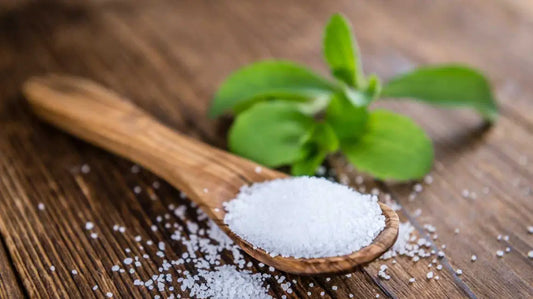So Sweet Erythritol V/s Other Artificial Sweeteners.

Erythritol is sugar alcohol created by fermenting wheat or corn starch. It’s naturally found in fruits like grapes and peaches, mushrooms, and fermented foods like beer, soy sauce, and cheese. You’ll find erythritol in “zero-calorie” or “diet” gum, candy, chocolate, and sweeteners (including some that also
contain monk fruit).
Some of the Highlighted benefits of Erythritol
1. Doesn’t impact blood sugar
Erythritol provides no calories.
It’s excreted in urine and doesn’t impact your blood glucose and insulin levels.
2. “Too” sweet without any calorie
Sugar alcohols are less sweet than other sugar substitutes, ranging from 25% to 100% of sugar’s sweetness. Erythritol is about 450 times sweet as sugar.
3. Doesn’t promote tooth decay
Unlike sugar and other sweeteners that contain carbs, erythritol won’t lead to cavities or tooth decay.
4. No aftertaste
Unlike many other zero-calorie sweeteners, erythritol is thought not to leave a funny taste in your mouth. And, it’s sometimes mixed with more intense sweeteners to hide or reduce their aftertaste.
Aspartame Artificial Sweeteners.
Aspartame is a common yet dangerous artificial sweetener hidden in many common foods and beverages. Aspartame poisoning can be serious and even life threatening. Detoxifying aspartame is the best solution to rid your body of this dangerous chemical and its toxic by-products.
Aspartame is an artificial sweetener used as a sugar substitute in foods and beverages without adding excess calories. People often consume products with aspartame in an effort to maintain or lose weight.
The reason for aspartame poisoning is that it dissolves into solution, travels throughout the body, and deposits within tissues. Unlike saccharin, the body digests aspartame. The digestive and absorption process results in aspartame accumulating in our bodies resulting in health problems.
Symptoms of Aspartame Poisoning
The effects of aspartame are far reaching and negatively impact many organ systems and structures, causing a diminished level of functioning and enjoyment of life.
Ear Symptoms - Tinnitus or buzzing in the ear is a common symptom of aspartame poisoning.Intolerance to noises and notable hearing loss can also occur.
Eye Symptoms - Aspartame can cause decreased vision, particularly night vision, blurring, tunnel vision and eye pain. People will also note decreased tears, the rouble wearing contact lenses ,and even bulging eyes.
Chest Symptoms - Breathlessness, elevated blood pressure and skipped or racing heartbeat are all
symptoms of aspartame toxicity.
Gastrointestinal Symptoms - People often experience an upset stomach, diarrhea (possibly bloody), abdominal pain and painful swallowing when using aspartame as a sweetener.
Skin and Allergies - Hives and intense itching, lip or mouth swelling and worsening of asthma all can occur due to aspartame.
So Stop experimenting with your sugar intake and replace your artificial sweeteners with So Sweet Erythritol.
contain monk fruit).
Some of the Highlighted benefits of Erythritol
1. Doesn’t impact blood sugar
Erythritol provides no calories.
It’s excreted in urine and doesn’t impact your blood glucose and insulin levels.
2. “Too” sweet without any calorie
Sugar alcohols are less sweet than other sugar substitutes, ranging from 25% to 100% of sugar’s sweetness. Erythritol is about 450 times sweet as sugar.
3. Doesn’t promote tooth decay
Unlike sugar and other sweeteners that contain carbs, erythritol won’t lead to cavities or tooth decay.
4. No aftertaste
Unlike many other zero-calorie sweeteners, erythritol is thought not to leave a funny taste in your mouth. And, it’s sometimes mixed with more intense sweeteners to hide or reduce their aftertaste.
Aspartame Artificial Sweeteners.
Aspartame is a common yet dangerous artificial sweetener hidden in many common foods and beverages. Aspartame poisoning can be serious and even life threatening. Detoxifying aspartame is the best solution to rid your body of this dangerous chemical and its toxic by-products.
Aspartame is an artificial sweetener used as a sugar substitute in foods and beverages without adding excess calories. People often consume products with aspartame in an effort to maintain or lose weight.
The reason for aspartame poisoning is that it dissolves into solution, travels throughout the body, and deposits within tissues. Unlike saccharin, the body digests aspartame. The digestive and absorption process results in aspartame accumulating in our bodies resulting in health problems.
Symptoms of Aspartame Poisoning
The effects of aspartame are far reaching and negatively impact many organ systems and structures, causing a diminished level of functioning and enjoyment of life.
Ear Symptoms - Tinnitus or buzzing in the ear is a common symptom of aspartame poisoning.Intolerance to noises and notable hearing loss can also occur.
Eye Symptoms - Aspartame can cause decreased vision, particularly night vision, blurring, tunnel vision and eye pain. People will also note decreased tears, the rouble wearing contact lenses ,and even bulging eyes.
Chest Symptoms - Breathlessness, elevated blood pressure and skipped or racing heartbeat are all
symptoms of aspartame toxicity.
Gastrointestinal Symptoms - People often experience an upset stomach, diarrhea (possibly bloody), abdominal pain and painful swallowing when using aspartame as a sweetener.
Skin and Allergies - Hives and intense itching, lip or mouth swelling and worsening of asthma all can occur due to aspartame.
So Stop experimenting with your sugar intake and replace your artificial sweeteners with So Sweet Erythritol.









